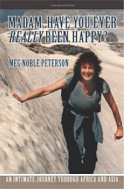My mother shuffled into the room where I was reading, and sat down on the bed. Anna, her long-time companion, was sleeping in the other bedroom. She spends a lot of time sleeping, for she’s exhausted taking care of Mother. She is 88–Mother is 90.
Mother started to say something, then furrowed her brow in frustration. The ideas didn’t come quickly anymore.
“Would you like to lie down next to me?” I asked.
She nodded. I pulled her small body to me and couched her head in my arm. I smoothed the silvery hair and stroked her cheeks, as she had done for me so often when I was a child. She snuggled deeper into my arm.
“Mother,” I asked, “how can you be so intimate with me when you don’t even remember who I am?”
She smiled. “Well, dear, you seem so wonderful. You’re just the kind of person I want to get to know better.”
I asked if she ever felt my father’s presence–his spirit. She looked perplexed. “His spirit? Why, I see him all the time. Just this morning he gave me this lovely blouse.”
“Oh, Mom, that’s not possible,” I said. “Daddy’s been dead for twenty years.”
She sat bolt upright. “What? You must be wrong. That can’t be.” She looked stricken, lost. I felt awful. When would I learn that facts had no meaning to her? Why couldn’t I let her live in her own reality?
That night I stirred in my sleep and reached to the other side of the bed where my mother slept. She was gone! Oh God, I prayed, please don’t let her be out in the hall like the other night. “Mother,” I called, as I leapt out of bed and went to the front hall. She did not answer. I found her fumbling with the chain on the door.
“Where on earth are you going at this hour?” I tried not to be impatient, but I’m not my best at 3 A.M.
“Why, to the bathroom, dear.”
How could I resist a slight smile? She was so ingenuous.
“Whoops, that would have been a big mistake. Wrong direction,” I said. I took her hand and gently turned her around.
“Oh, dear, you children are always rearranging this house. When did you move the bathroom over there? That’s not where it was yesterday.”
In the two months since my last visit, Mother had moved into a whole new world.
“I have to go now to the upstairs apartment,” she had said shortly after I arrived. “This place is lovely, and he fixed it up just for me, but I prefer to live upstairs.”
“Who is ‘he,’ Mother?”
“Well, Daddy, of course. Sometimes I think I should get angry at him for staying away so long…it’s been months since I’ve seen him, but then I know he’s very busy, traveling and speaking, so I forgive him.”
I did not argue. At times I feel as if she is already with my father. She seems so happy and content. But at other times I see a frightened child who doesn’t know where she is, who pleads with me not to make her get out of bed in the morning–to leave her alone and let her sleep. Let her die. She doesn’t say this; her eyes do.
During her slow mental decline, she has remained gentle, good natured, and charming, traits which earned her love and respect during her years as a teacher and an actress. But now it’s as if all her waking hours are spent on a stage with an invisible curtain between her and the rest of us. Only her old friend, Anna, seems able to kindle a spark of recognition and a genuine response. She moved in forty years ago–to help care for my grandparents and sick aunt–and never left. She prods Mother’s memory constantly, and refuses to give in to the kind of desperation I feel when I watch Mother recede further and further into her own world.
But Anna is getting so frail that between the two of them they seem to have only one functioning mind and one body. Together they survive each day–too overwhelmed to do anything but the bare essentials, like eating or getting dressed or taking a bath. And they’re always exhausted.
It’s heartbreaking to see Mother reduced to such helplessness, for it was always she who had been doing the caring. My grandparents lived with us, a deaf aunt, and, off and on, an assortment of young women who had “gotten into trouble.” This made for a wonderfully rich extended family while I was growing up.
Mother had seemed indestructible in those days. She was compulsive about the laundry and the ironing, spending every Monday evening in the basement struggling with the old ringer machine. She mended her silk stockings to save money, and handled the family finances, meticulously balancing the family budget. In the years before the oil furnace was installed in the old parsonage, she shoveled coal into the hopper and, with my sisters and me, carried out five metal baskets of ashes every Tuesday for pick-up. Once she fell down the basement stairs with a bucket and mop in her hands, and, before anyone knew what had happened, came walking back up with a bottomless bucket. “Look what I put my foot through on the way down,” she said, cheerily. “Well, we needed a new bucket.”
I never knew my mother not to be busy. But she had trouble finishing projects–like sewing a dress or reading all the books and magazines that came into the house. So she just piled everything in the corner to be dealt with later. And because she was constantly behind, she was notoriously late for everything. To this day I feel strange getting to church on time, because, even as a minister’s wife, my mother invariably walked in after the first hymn, her family trailing behind her.
Yet I have never known a happier, more contented woman, for at the center of her life was my father–her close companion and lover for forty-three years. They were so close, in fact, that at times my sisters and I felt like outsiders. They discussed his sermons and speeches together, read books to each other, wrote and directed amateur plays, climbed mountains, played music. None of our friend’s parents behaved like ours–passionate goodbye kisses in the morning and long embraces upon returning in the evening. They were, to us, living proof of “happily ever after.”
Because of this closeness, we were amazed at how calm and philosophical Mother was when he died.
“It will be harder on you girls than on me,” she said, when I asked why she wasn’t falling apart like the rest of us. “You’ll have to live a lot longer without him.”
What we didn’t realize, at the time, was that Mother never mourned, never wailed, and never talked about his death as we did, because, to her, he never really died.
For ten years she kept an extra apartment in the building where they had moved after he retired from the university. They lived down the hall with Anna and Aunt Ditty, my father’s sister, while the new apartment was being redecorated.
But Daddy died before they could move in. There stood his desk, with his unfinished manuscript, the pen still where he had left it the day he had had his stroke. His ceremonial commencement robe hung in the closet, along with his doctoral hood. His overshoes remained at the entrance. Only last year did I spirit his suits from my mother’s spare closet and give them to his grown grandsons.
“One of these days I’m going to sort things out,” Mother would say of the unoccupied apartment, “…as soon as I get a minute.”
I said nothing, for she seemed so happy–taking a great interest in her fourteen grandchildren, and opening her cottage in New Hampshire every summer for all the family to enjoy.
But this changed when her old apartment building was sold, and she and Anna were evicted. I wondered if it was this sudden, wrenching move that started her on her downward spiral.
On moving day we were standing outside the elevator in the new apartment building. I looked over at Mother. She was crying, softly. She seldom cried, so I was taken by surprise.
“What’s the matter, Mom?” I asked.
“Daddy’s gone,” she replied. “He’s dead. He’s left us.”
I took her hand and said, very gently, “It’s time you mourned, Mom. It’s time you let him go.”
That was five years ago.
Now I looked across the room at my mother. She was sitting in a chair by the window, rocking slowly, an opened book of Norman Rockwell paintings in her lap.
“Come over here, dear, and let me look at you,” she said.
I went over and kneeled down next to her. “You’re still the same wonderful person you were a few minutes ago, aren’t you?” she asked.
“Yes, I am.” I hugged her. “I love you, Mom.”
“Why, thank you, dear.” She smiled, and with unusual demonstrativeness, she hugged me back.
When I left the next morning, Mother was still in bed. She raised her head slightly and kissed me on the cheek. “Goodbye, dear,” she said. “I suppose you’ll be back tomorrow.”
Anna was scurrying around, puttering and nattering, and stopping to catch her breath after every few steps. I wondered how long it would be before she dropped from exhaustion. And what then would be my mother’s fate? Nobody–not even my sisters and I–could give her such constant love and care. I was grateful to Anna, but I felt helpless, and guilty. And all I wanted to do was flee.
I drove up the ramp onto route 81 South. The towers of the university were behind me and the rolling hills of central New York State stretched ahead. Suddenly I was overwhelmed with sadness–the kind I had felt when my father died. Tears flowed down my face. I pulled off the highway and sat for a long time, my head resting on the steering wheel.
No matter how much I had covered it up with activity and humor this past week, I had, deep down, been wishing for my mother’s death. How could I? It seemed so wrong, so unnatural. I was viewing her as an empty shell because she was not the whole person I once knew. The comparison wasn’t fair. But I was bitterly angry that my lovely, caring mother should suffer such an undeserved, undignified end.
My sister’s voice penetrated the walls of my desolation: “Mother can no longer say in words what she means,” she had told me before my visit. “She now communicates on a deeper level. But love still emanates from her, and she expresses it more than ever before, if you just give her a chance. Her inner core, her real being, is still alive. We must accept her for who she is right now–that’s the best we can do.”
As quickly as it had come, the sadness left, and a feeling of peace washed over me.
I had my own letting go to do. Mother now had something to give me–and I her–that was quite different from what we had known in the past.
Her words. spoken, so I thought, from the depths of her confusion, came back to me: “You’re just the kind of person I want to get to know better.”
In the time left to us, this is exactly what I intend to do.

